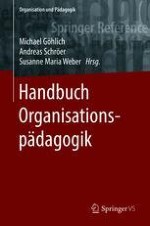2018 | OriginalPaper | Buchkapitel
Akteur-Netzwerk-theoretische Grundlagen der Organisationspädagogik
verfasst von : Henning Pätzold
Erschienen in: Handbuch Organisationspädagogik
Verlag: Springer Fachmedien Wiesbaden
Aktivieren Sie unsere intelligente Suche, um passende Fachinhalte oder Patente zu finden.
Wählen Sie Textabschnitte aus um mit Künstlicher Intelligenz passenden Patente zu finden. powered by
Markieren Sie Textabschnitte, um KI-gestützt weitere passende Inhalte zu finden. powered by
